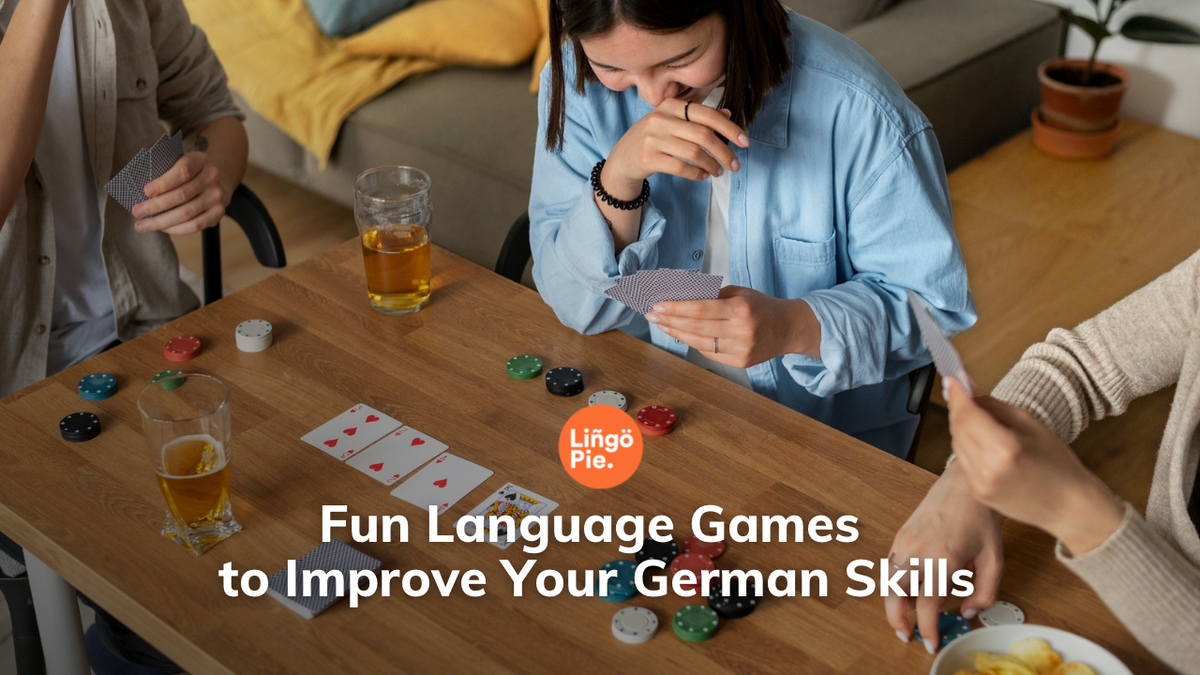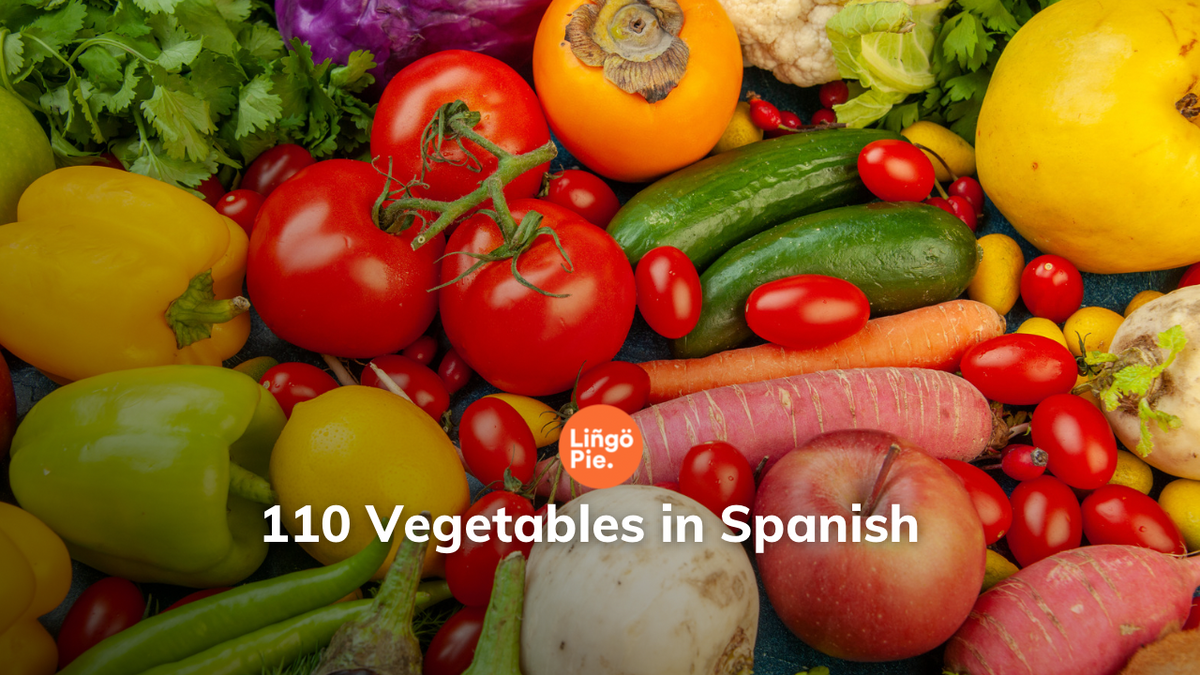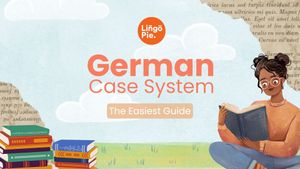Learning a new language, such as German, requires consistent practice and active engagement. Whether you're a beginner in German or trying to brush up on your skills, finding enjoyable ways to immerse yourself in the language can significantly enhance your learning experience.
Language games offer a dynamic and interactive approach to learning that not only makes the process enjoyable but also highly effective. In this blog post, we'll explore a variety of fun language games designed to help you practice and improve your German skills while having fun!

1. Word Chain (Wortkette)
In Word Chain, players begin with a word in German. The next player then has to come up with a word that starts with the last letter of the previous word. For example, if the first word is "Haus" (house), the next word could be "Schule" (school), and so on.
Example and demonstration of how to play:
- Player 1: "Haus" (house)
- Player 2: "Schule" (school)
- Player 3: "Elefant" (elephant)
- Player 4: "Tasse" (cup)
- And so on...
Benefits
Improves vocabulary: Players are constantly exposed to new words as they try to come up with words related to the previous ones.
Thinking on your feet: Since there's time pressure to keep the game flowing, players must think quickly and creatively.
Quick recall: By repeatedly retrieving words from memory, players strengthen their ability to recall vocabulary on the spot.
2. Taboo (Tabu)
In Taboo, players take turns describing a word in German without using certain taboo words or phrases associated with it. The objective is to get your teammates to guess the word correctly within a time limit while avoiding the restricted terms.
Example and demonstration of how to play:
- Divide players into teams.
- Each team selects a player to be the describer for a round.
- The describer draws a card with a word in German on it.
- The card also lists taboo words or phrases that the describer cannot use while trying to convey the word.
- The describer then has a limited time (usually a minute) to describe the word to their teammates without using the taboo terms.
- Teammates try to guess the word based on the description provided.
- If the word is guessed correctly within the time limit, the team earns a point.
- Rotate the describer role to the next player and continue playing until all players have had a chance to describe words.
Benefits
Enhances vocabulary: Players must find alternative ways to describe words, which exposes them to new vocabulary and phrases.
Forces creativity in describing words: With the restriction on certain words, players are challenged to think creatively and use language in innovative ways.
Improves speaking skills: Describers must articulate their thoughts clearly and concisely, which helps improve their ability to communicate effectively in German.

3. 20 Questions (20 Fragen)
In 20 Questions, one player thinks of a German word, and the other players have 20 questions to guess what it is. The player who thought of the word can only answer "yes" or "no" to the questions asked by the other players. The objective is for the guessing players to narrow down the possibilities and correctly guess the word within the limit of 20 questions.
Example and demonstration of how to play:
- Player 1 thinks of a German word, for example, "Apfel" (apple).
- The other players take turns asking questions, such as "Is it a food?" or "Is it a fruit?"
- Player 1 can only respond with "yes" or "no."
- Based on the answers, the players continue asking questions to narrow down the possibilities.
- The guessing players have 20 questions in total to figure out the word.
- If they guess the word correctly within the limit, they win. Otherwise, Player 1 wins.
Benefits
Encourages asking questions in German: Players must formulate questions in German, which helps reinforce language skills and encourages active communication.
Reinforces vocabulary: As players ask questions and receive answers, they encounter and reinforce vocabulary related to various topics.
Sharpens listening skills: Players must pay close attention to the answers given by Player 1 in order to make informed guesses and narrow down the possibilities, which sharpens their listening skills in German.
4. Charades (Scharade)

In Charades, players act out German words or phrases without speaking, while the other players attempt to guess what they are portraying. The actor cannot use any verbal cues or sounds but must rely solely on gestures, body language, and facial expressions to convey the word or phrase.
Example and demonstration of how to play:
- Players form two teams.
- One player from Team A acts out a German word or phrase chosen from a list or generated randomly.
- The actor has a limited time (usually one minute) to convey the word or phrase to their team members using gestures.
- Team members try to guess the word or phrase based on the actor's actions.
- If Team A guesses correctly within the time limit, they earn a point.
- Then, it's Team B's turn to choose an actor and play their round.
- Continue alternating between teams until all players have had a chance to act out words or phrases.
Benefits
Enhances non-verbal communication skills: Players must effectively convey meaning through gestures and body language, improving their ability to communicate without relying on words.
Reinforces vocabulary: Acting out words or phrases in German reinforces vocabulary as players associate gestures with specific words or concepts.
Makes learning fun: Charades adds an element of excitement and entertainment to language learning, making it a enjoyable and engaging way to practice German skills.
5. Language Bingo (Sprach-Bingo)
Language Bingo is played similarly to traditional bingo, but instead of numbers, players use bingo cards with German words or phrases. These words or phrases can be related to a specific theme or category, such as food, animals, or daily activities. As the game progresses, players mark off the words or phrases on their bingo cards as they hear them spoken by a designated caller or during a conversation.
Example and demonstration of how to play:
- Prepare bingo cards with a grid of squares, each containing a different German word or phrase.
- Distribute the bingo cards to the players.
- Choose a caller who will read out German words or phrases randomly.
- As the caller reads out each word or phrase, players listen carefully and mark off the corresponding square on their bingo cards.
- The first player to mark off a line (horizontal, vertical, or diagonal) of squares shouts "Bingo!" and wins that round.
- Alternatively, you can continue playing until someone fills their entire bingo card (full house) for a bigger win.
Benefits
Reinforces listening skills: Players must actively listen for specific words or phrases in German, which enhances their ability to understand spoken language.
Expands vocabulary: Exposure to a variety of German words or phrases during the game helps players learn new vocabulary and become more familiar with common expressions.
Adds an element of competition: Language Bingo introduces a fun and competitive aspect to language learning, motivating players to actively participate and engage with the material.
6. Memory Matching Game (Gedächtnisspiel)
In the Memory Matching Game, players are presented with a set of cards, each containing a German word and its corresponding English translation. The cards are initially placed face down in a grid formation. Players take turns flipping over two cards at a time, attempting to find matching pairs of German words and their translations. The player with the most matches at the end of the game wins.
Example and demonstration of how to play:
- Gather a set of cards with German words on one side and their English translations on the other.
- Shuffle the cards and lay them out face down in a grid.
- Players take turns flipping over two cards.
- If the two cards match (i.e., the German word and its translation), the player keeps the pair and takes another turn.
- If the cards do not match, they are flipped back over, and it's the next player's turn.
- The game continues until all pairs have been matched.
- The player with the most matches at the end of the game wins.
Benefits
Improves vocabulary: Players reinforce their vocabulary by associating German words with their English translations.
Enhances memory: Matching pairs of cards requires players to remember the location of previously flipped cards, improving memory skills.
Provides visual reinforcement: Associating words with visual representations (the cards) helps solidify language learning.
7. Storytelling Circle (Geschichtenkreis)
In the Storytelling Circle, players sit in a circle and collaboratively create a story in German, with each player contributing a sentence or phrase at a time. The story can be based on a prompt or theme chosen by the group, or it can develop spontaneously. This game encourages creativity, cooperation, and linguistic spontaneity.
Example and demonstration of how to play:
- Players sit in a circle and decide on a theme or prompt for the story.
- The first player starts the story by saying a sentence or phrase in German, setting the scene or introducing a character.
- The next player adds onto the story by contributing another sentence or phrase in German, building upon the previous player's contribution.
- Players continue taking turns, each adding a new element to the story.
- The game continues until the story reaches a natural conclusion or the group decides to end it.
Benefits
Encourages creativity: Players exercise their imagination by contributing to the creation of a unique story.
Promotes cooperation: Collaborative storytelling fosters teamwork and encourages players to listen to and build upon each other's ideas.
Develops speaking skills: Players practice constructing sentences and expressing ideas in German spontaneously and fluidly.

8. German Video Games (Videospiele)
There are video games specifically designed to teach German language and culture while providing entertainment and interactive gameplay. These games immerse players in virtual environments where they must interact with characters, solve puzzles, complete quests, and navigate through challenges—all while learning and practicing German language skills.
Example and demonstration of how to play:
- Choose a German language video game that aligns with your interests and proficiency level.
- Start playing the game and immerse yourself in the storyline and gameplay mechanics.
- Pay attention to dialogue, text prompts, and instructions presented in German.
- Engage with characters and NPCs (non-playable characters) by selecting dialogue options and responding in German.
- Solve puzzles, complete quests, and progress through the game while actively using and practicing German language skills.
Benefits
Immersive learning experience: Video games provide an immersive and interactive environment for learning German, allowing players to practice language skills in a contextually relevant and engaging way.
Contextual learning: Players learn German within the context of the game's storyline, which can help reinforce vocabulary and grammar concepts through real-world usage.
Motivating and enjoyable: Learning German through video games can be highly motivating and enjoyable, as players are motivated to progress through the game while simultaneously improving their language skills.
Final Words
Incorporating language games into your German learning routine is not only beneficial but also essential for enhancing your skills effectively. Throughout this post, we've explored various games that not only make learning enjoyable but also contribute significantly to your language acquisition journey.
By engaging in games like Word Chain, Taboo, 20 Questions, Charades, and Language Bingo, you not only reinforce vocabulary and grammar but also sharpen your listening, speaking, and non-verbal communication skills. These games provide an interactive and dynamic way to practice German in a supportive and enjoyable environment.
Remember, learning a language doesn't have to be a tedious task. With the right approach, it can be fun, engaging, and highly effective. So, embrace the joy of learning through games, and share your experiences with others!
Learn German With Lingopie Through TV Shows!
If you're looking for more language-learning resources, consider using Lingopie! Lingopie offers a variety of engaging content, including movies and TV shows in German, accompanied by interactive subtitles and language-learning tools. It's a fantastic way to immerse yourself in the language while enjoying captivating entertainment.
Start your language learning adventure today and don't forget to share your discoveries and progress with us. Together, let's continue to explore the wonders of the German language and celebrate our achievements along the way!







![7 Best Apps To Learn German On Your Own [REVIEWED]](/blog/content/images/size/w300/2026/01/best-apps-to-learn-german-on-your-own.png)
![6 Best German Translator Apps For Beginners [TESTED]](/blog/content/images/size/w300/2026/01/Best-german-translation-apps-for-beginners-.jpeg)
